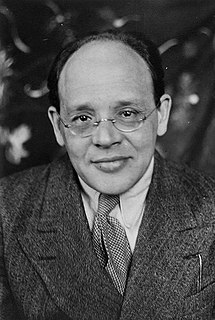 W
WIsaac Emmanuilovich Babel was a Russian writer, journalist, playwright, and literary translator. He is best known as the author of Red Cavalry, Story of My Dovecote and The Odessa Tales—stories from the life of Jewish gangsters from Odessa led by Benya Krik. He has been acclaimed as "the greatest prose writer of Russian Jewry". Babel was arrested by the NKVD on 15 May 1939 on fabricated charges of terrorism and espionage, and executed on 27 January 1940.
 W
WYulian Bachynsky was a Ukrainian diplomat. In 1919 he attempted to implement his idea of an independent Ukraine and went to Washington to obtain the US government's recognition of the Ukrainian People's Republic.
 W
WJózef Batory was a Polish soldier and resistance fighter during World War II and after.
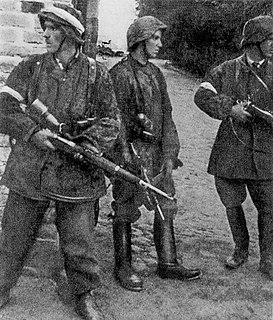 W
WCaptain Franciszek Błażej was born on 27 October 1907 in Nosówka, in Austrian Galicia. He was a professional officer of the Polish Army and participated in the Polish September Campaign. Some time in the early 1940s, he joined the Rzeszów division of the Union for Armed Struggle.
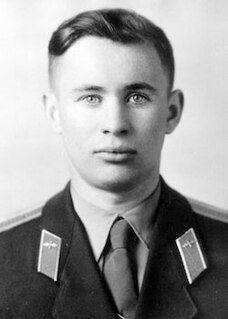 W
WValentin Vasiliyevich Bondarenko was a Soviet fighter pilot selected in 1960 for training as a cosmonaut. He died as the result of burns sustained in a fire during a 15-day low-pressure endurance experiment in Moscow. The government concealed the death, along with Bondarenko's membership in the cosmonaut corps, until 1980. A crater on the Moon's far side is named after him.
 W
WKarol Chmiel (1911–1951) was born on 17 April 1911 in the village of Zagorzyce to the peasant family of Antoni and Katarzyna née Charchut. He graduated from high school in Dębica, and was admitted to the prestigious Jagiellonian University in Kraków, where he studied law. After graduation, in 1935, Chmiel settled in Wojslaw, a village near Mielec; his wife Irena Suchodolska was a school principal, and he worked for the Town Hall in Mielec.
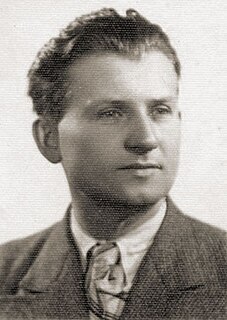 W
WŁukasz Ciepliński [Polish pronunciation: [ˈwukaʂ t͡ɕɛˈpliɲskʲi]] was a Polish soldier who fought in the Polish anti-Nazi and anti-communist resistance movements. He used various aliases: Pług, Ostrowski, Ludwik, Grzmot, and Bogdan. Ciepliński was executed at Mokotów Prison in Warsaw, with a shot to the back of the head by the Polish secret police, Urząd Bezpieczeństwa.
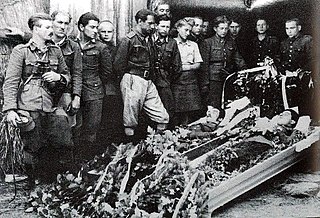 W
WHieronim Dekutowski was a Polish boy scout and soldier, who fought in Polish September Campaign, was a member of the elite forces Cichociemni, fought in the Home Army and after World War II, fought the communist regime as one of commanders of Wolność i Niezawisłość.
 W
WAdam Doboszyński was a soldier of the Polish Army, writer, anti-Semitic right-wing politician, and a social activist. Born in 1904 in Kraków, he was murdered by the Communist secret services in 1949, in the notorious Mokotów Prison in Warsaw.
 W
WMarian Gołębiewski , a soldier of the Home Army and the anti-Communist organization Wolność i Niezawisłość was born on April 16, 1911 in Płońsk, Poland.
 W
WStanisław Karolkiewicz (1918–2009) was born in 1918 in the Polish historical region of Podlasie. Raised in a patriotic family, he joined the Polish Army in the 1930s, and then fought in the Polish September Campaign, in the area of Upper Silesia. On 17 September 1939, when the Red Army, allied with the Wehrmacht, attacked eastern Poland, Karolkiewicz was around Nisko.
 W
WMieczysław Kawalec, born in 1916 in the village of Trzciana, Rzeszów County, was a Polish resistance fighter. In the late 1930s, he graduated from the Law Department at Lwów University, and took the job of an assistant there. During the Polish September Campaign, he fought in the defence of Lwów, and in 1940 he joined the Rzeszów District of Union of Armed Struggle (ZWZ).
 W
WMajor Adam Lazarowicz was a Polish military officer who played a prominent role in the Polish resistance movement in the German-occupied Poland in the Second World War.
 W
WJózef Stanisław Łobodowski was a Polish poet and political thinker.
 W
WWladyslaw Ossowski, was a Polish boyscout and member of the White Couriers.
 W
WLucrețiu Pătrășcanu was a Romanian communist politician and leading member of the Communist Party of Romania (PCR), also noted for his activities as a lawyer, sociologist and economist. For a while, he was a professor at Bucharest University. Pătrășcanu rose to a government position before the end of World War II and, after having disagreed with Stalinist tenets on several occasions, eventually came into conflict with the Romanian Communist government of Gheorghe Gheorghiu-Dej. He became a political prisoner and was ultimately executed. Fourteen years after Pătrășcanu's death, Romania's new communist leader, Nicolae Ceaușescu, endorsed his rehabilitation as part of a change in policy.
 W
WStanisław Włodzimierz Pyjas (1953–1977) was a Polish student of the Jagiellonian University in Kraków, member of the anticommunist student movements. He died on May 7, 1977 in Kraków. The exact circumstances of Pyjas’ death are still a mystery and his case, which is still disputed, shook public opinion in Poland. According to one scenario he was murdered and the killers, probably members of the communist Secret Services, arranged the death to look like an accident. The official scenario, however, states that his death occurred after he fell from the stairs while being drunk. In 2011 his body was examined, and the outcome states that it was the fall that caused his death and that he had not been beaten.
 W
WRudolf "Rudek" Regner, was a Polish scout, soldier and member of the White Couriers. Before World War II, he worked as a bookkeeper in a cooperative located in southeastern Polish town of Turka.
 W
WCaptain Józef Rzepka was born in 1913 in the village of Bratkowice in Austrian Galicia. He graduated from the 1st High School in Rzeszów, then went to Warsaw to study law at Warsaw University.
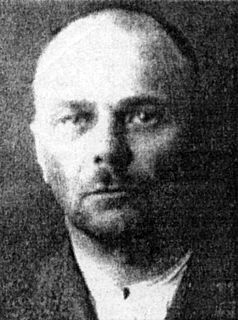 W
WJan Sierada was a Belarusian statesman, pedagogist and writer, the first president of the Belarusian Democratic Republic.
 W
WLev Davidovich Bronstein, better known as Leon Trotsky, was a Russian Marxist revolutionary, political theorist and politician. Ideologically a communist, he developed a variant of Marxism known as Trotskyism.
 W
WSerhiy Yefremov was a Ukrainian literary journalist, historian, critic, political activist, statesman, and academician. He was a member of the Ukrainian Academy of Science (1919) and Shevchenko Scientific Society in Lviv. Yefremov is his literary pseudonym; his real name is Okhrimenko.
 W
WNikolay Ivanovich Yezhov was a Soviet secret police official under Joseph Stalin who was head of the NKVD from 1936 to 1938, during the height of the Great Purge.